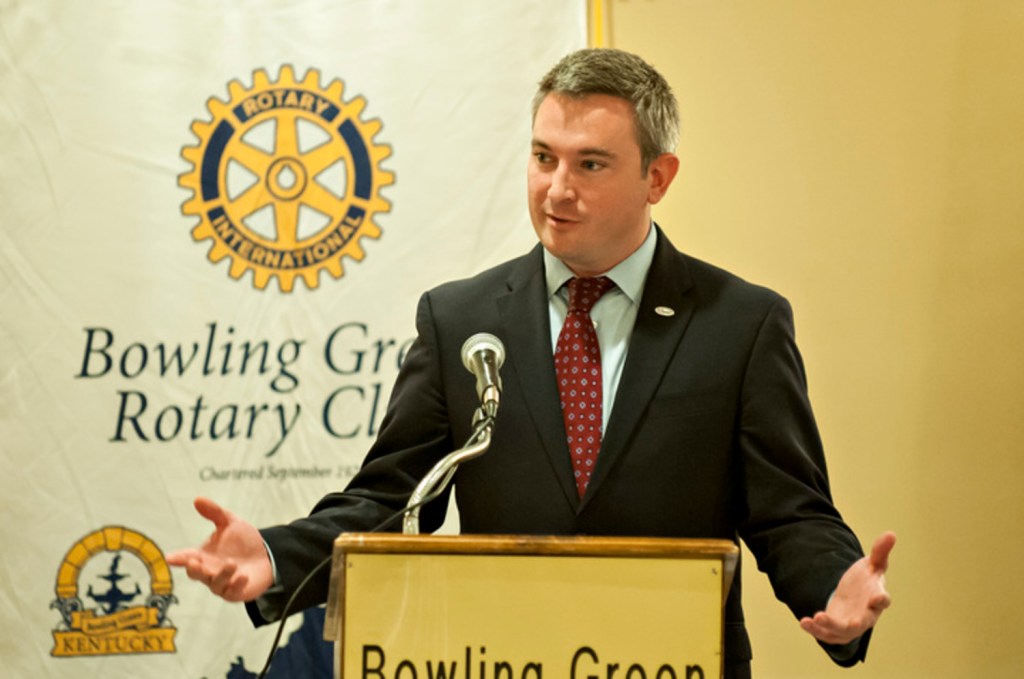Commissioner talks of growing agriculture efforts in state
Published 4:39 pm Wednesday, June 15, 2016

- Agriculture Commissioner Ryan Quarles speaks during the Bowling Green Rotary Club meeting Wednesday, June 15, 2016, at the Bowling Green Country Club. (Miranda Pederson/photo@bgdailynews.com)
Promoting industrial hemp, fighting hunger and improving agriculture education were among the many efforts Agriculture Commissioner Ryan Quarles said are underway in Kentucky.
Quarles, a Republican from Scott County, told members of the Bowling Green Noon Rotary Club on Wednesday that Kentucky has a lot to be proud of when it comes to agriculture.
“We are one of the nation’s leaders when it comes to farming and what you can do with it,” he said. “Farming is a story about small towns. It’s a story about family farms. It’s a story that almost every American can relate to if you go back far enough in your family tree.”
Farming has come a long way in the United States compared to where it was 50 years ago, Quarles said.
“We have doubled the amount of food we can produce in the United States in the past 50 years,” he said. “We’re doing it with only three fourths of the land that we used to farm and doing it with 22 million less people.”
The nation’s become more successful at doing more with less along with feeding a growing world population, he said. Kentucky is leading the way, he said, because of Kentucky farmers, research and innovate planting techniques.
Despite that, Kentucky still has its challenges and areas to improve in. Quarles singled out food insecurity as one challenge still facing the state.
“It is an unfortunate reality that one in six Kentuckians go to bed hungry,” he said. “One in four school children are considered food insecure.”
The problem has prompted the Kentucky Department of Agriculture to launch an anti-hunger initiative. The initiative charges the recently convened Kentucky Hunger Task Force to study the issue and determine which resources can be used to combat it.
“Some early solutions are helping farmers harvest unmarketable produce,” Quarles said. Some edible food goes to waste because of a few blemishes, he said. That produce could be harvested and taken to food banks, he said.
“We’re looking for innovative ways to try to look at the assets we already have and help prevent a preventable issue,” he said.
There will be a regional meeting in Bowling Green about the issue on July 21. A specific location hasn’t been decided yet.
Quarles was tight-lipped about a partnership with a federal investigative agency to help protect against consumer fraud. He said an announcement will come in a week or so.
“That’s all I can say at this point,” he said. “There’s more to come.”
Quarles also discussed plans to develop alternative crops in the state, such as industrial hemp.
“Industrial hemp has a future in our state,” he said. “It’s a crop that connects our past to our future.”
He believes Kentucky is best positioned to take advantage of it. Over 4,000 acres of hemp have been planted in Kentucky this year in effort to study the crops’ viability. Other alternative crops include hops, canola and chia.
Cheryl H. Allen, president elect of the Bowling Green Rotary Club, thought the talk was informative.
“What we put into our bodies affects us now and for generations to come,” she said.
Jack Thomas, who was the first president of Southcentral Kentucky Community and Technical College, appreciated the commissioner’s call for more agriculture education.
“The young people have not a clue on where their food comes from,” he said.
Current SKYCTC President Phil Neal also enjoyed hearing about farming and “the things that are going on in Warren County that you don’t see everyday.”
— Follow reporter Aaron Mudd on Twitter @aaron_muddbgdn or visit bgdailynews.com.





